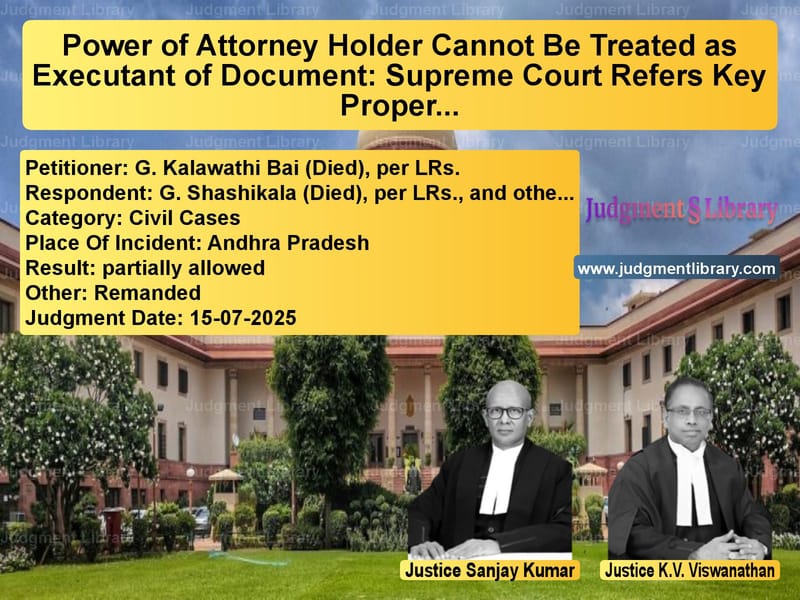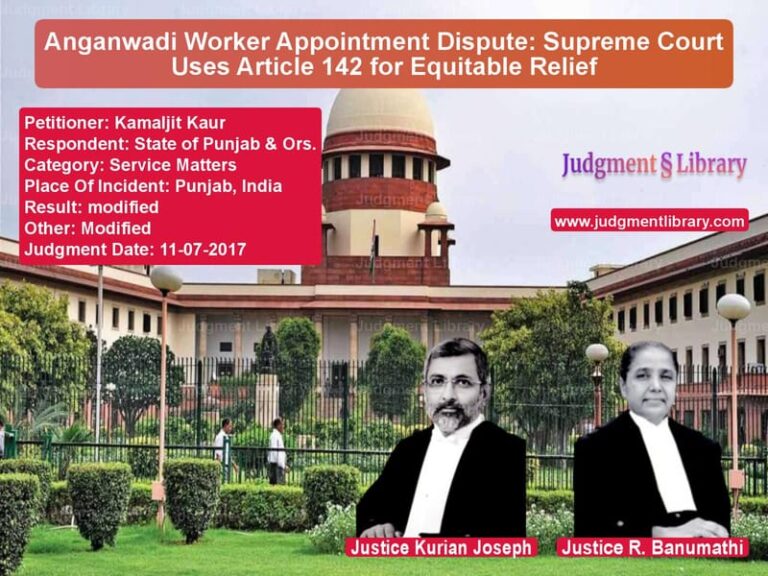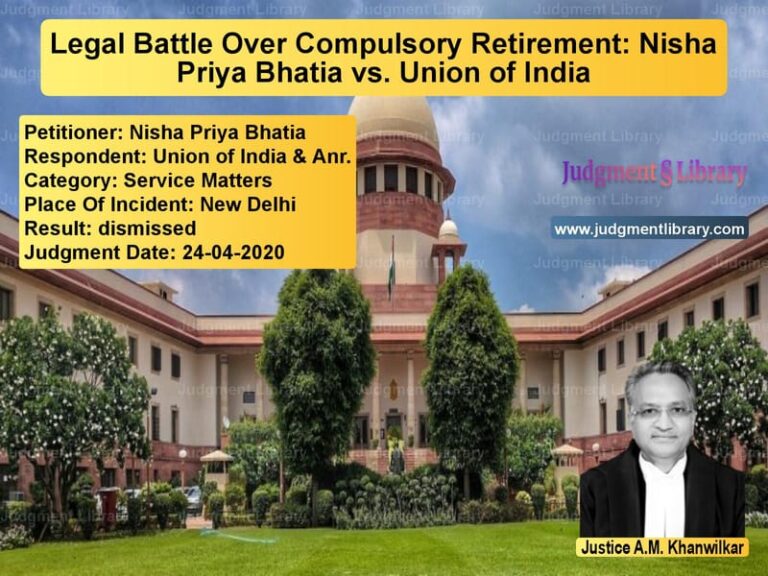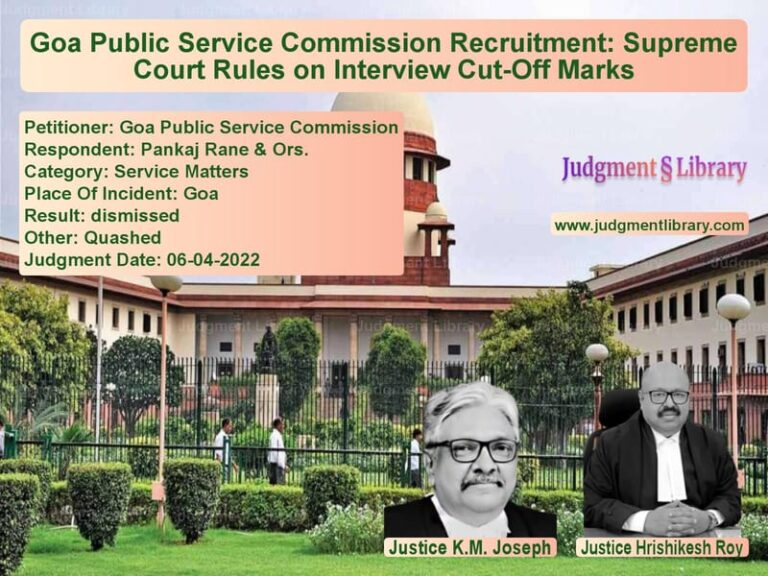Power of Attorney Holder Cannot Be Treated as Executant of Document: Supreme Court Refers Key Property Registration Issue to Larger Bench
In a significant development that could reshape property registration procedures across India, the Supreme Court has expressed serious reservations about a previous judgment concerning power of attorney holders and their status when executing documents. The case of G. Kalawathi Bai (deceased) through legal representatives versus G. Shashikala (deceased) through legal representatives and others brings to light crucial questions about the interpretation of the Registration Act, 1908, and the safeguards required when properties are transferred through power of attorney arrangements.
The legal battle revolves around a registered Irrevocable General Power of Attorney dated October 15, 1990, allegedly executed by Ranveer Singh and his wife, Gyanu Bai, in favor of their tenant, G. Rajender Kumar. Following this, three registered sale deeds dated November 16, 1990, July 18, 1991, and August 16, 1991, were executed by Rajender Kumar as the power-of-attorney holder in favor of his wife, G. Shashikala. The core dispute emerged when Ranveer Singh denied ever executing the General Power of Attorney, casting doubt on the validity of the entire transaction chain.
The Trial Court framed several critical issues, including whether Ranveer Singh had indeed appointed G. Rajender as his General Power of Attorney and whether the sale deeds executed by Rajender Kumar in favor of G. Shashikala were valid. Additional issues were framed concerning whether the alleged General Power of Attorney was properly authenticated by the Registrar as required under Sections 32, 33, 34, and 35 of the Registration Act, 1908, and whether the Registrar had properly recognized Rajender Kumar as the power-of-attorney holder at the time of executing the three sale deeds as required under Section 34(3)(c) of the Act read with Rule 53 of the Rules framed thereunder.
During arguments before the Supreme Court, the earlier decision in Rajni Tandon vs. Dulal Ranjan Ghosh Dastidar and another (2009) was cited, which the High Court had relied upon in support of its conclusions. The Supreme Court bench comprising Justices Sanjay Kumar and K.V. Viswanathan found it necessary to thoroughly examine this precedent and its ratio.
The Rajni Tandon case involved a notarized power of attorney where the principal had authorized the agent to transfer his property and execute necessary documents. The power-of-attorney holder executed a sale deed and presented it for registration, which was challenged on the ground that the power-of-attorney holder needed to present an authenticated power-of-attorney before the Sub-Registrar to get the sale deed registered. The coordinate bench in that case framed the issue as: ‘whether a person who executes a document under the terms of the power of attorney, is, insofar as the registration office is concerned, the actual executant of the document and is entitled under Section 32(a) to present it for registration and get it registered.’
The bench in Rajni Tandon opined that the expression ‘person executing’ in Section 32(a) of the Act signifies the person actually executing the document and includes a principal who executes by means of an agent. Elaborating further, the bench held that ‘where a person holds a power of attorney which authorizes him to execute a document as an agent for someone else and he executes such document under the terms of the power of attorney, he is, so far as the registration office is concerned, the actual executant of the document and is entitled under Section 32(a) to present it for registration and get it registered.’ The bench concluded that in such situations, the duty cast on the registering officer under Section 32 is only to satisfy himself that the document was executed by the person by whom it purports to have been signed, and upon being so satisfied, the registering officer has to proceed with its registration.
The Supreme Court in the present case meticulously examined the statutory scheme under the Registration Act, particularly Part VI titled ‘Of presenting documents for registration’ comprising Sections 32 to 39. Section 32 details the persons competent to present a document for registration before the registering authority. Section 32(a) speaks of the person ‘executing’ or ‘claiming under’ the document presenting it for registration, while Section 32(b) refers to presentation by a representative or assign of such person. Section 32(c) specifically addresses presentation of the document by the agent of such person, representative or assign, who has been authorized to do so by a power of attorney executed and authenticated in the manner prescribed.
Section 33 of the Act specifies that the power of attorney recognizable for the ‘purposes of Section 32’ has to fulfil particular requirements to validate it and, consequently, the presentation of the document by such power-of-attorney holder for registration. The Court also noted that Rules 49 to 55 in Chapter XI of the Andhra Pradesh Rules framed under the Act set out specific requirements for compliance with Section 33. Rule 53 categorically states that even if a power of attorney is registered, it would not be valid for registration purposes unless it is authenticated.
Further, Section 34(3)(a) casts a duty on the registering officer to enquire whether the document presented for registration was executed by the persons by whom it purports to have been executed; satisfy himself as to the identity of the persons appearing before him and alleging that they have executed the document; and in the case of any person appearing as a representative, assign or agent, satisfy himself of the right of such person so to appear. Section 35 additionally requires the registering officer to satisfy himself as to the competence and identity of the persons presenting the document for registration.
After this comprehensive analysis, the Supreme Court expressed its disagreement with the view taken in Rajni Tandon. The Court stated: ‘With due respect to the learned Judges who decided Rajni Tandon (supra), we are unable to subscribe to this view.’ The Court provided a compelling rationale for its position: ‘A power-of-attorney holder executes a document, say, a sale deed, not in his own name but in the name of his principal, and signs it on behalf of the principal by virtue of the authority conferred upon him by the power of attorney. He does not, thereby, become the ‘executant’ of the sale deed as the said sale deed would invariably be executed in the name of the principal, who would be shown therein as represented by the power-of-attorney holder. The power-of-attorney holder, therefore, does not become the ‘executant’ referred to in Section 32(a) of the Act but would still remain the agent and, by virtue of being authorized by the power of attorney, he merely executes and signs it on that principal’s behalf.’
The Court further explained that this is why power of attorney documents typically contain clauses not only authorizing the holder to execute transfer documents but also specifically authorizing them to present such documents for registration before the registering officer. In the present case, the alleged Irrevocable General Power of Attorney dated October 15, 1990, contained clauses authorizing the holder ‘to sign all the documents of transfer such as sale deed/s mortgage, lease, deeds, etc. in respect of all above Property on my behalf’ and ‘to present and sign all the documents of transfer before the registering authority, by executing the same in respect of the above property on my behalf.’
The Court pointed out the logical inconsistency that would arise from the Rajni Tandon interpretation: ‘The contrary interpretation adopted and applied by the Bench in Rajni Tandon (supra) would lead to a rather incongruous situation where a notarized power-of-attorney holder, as in that case, who executes a sale deed would become its ‘executant’ in terms of Section 32(a) of the Act and would be entitled to get the sale deed registered without further ado but, hypothetically and only for the purpose of illustration without reference to the legal repercussions and validity of such an act, if that notarized power-of-attorney holder then executes a power-of-attorney, even if registered, in favour of any person to merely present the sale deed executed by him for registration, that registered power-of-attorney holder has to pass the tests set out in Sections 32(c), 33, 34 and 35 of the Act!’
The Court emphasized the serious implications of this interpretation: ‘In effect, the merely mechanical act of presentation of a document for registration would have to be subjected to rigorous scrutiny but the weightier act of executing a document transferring title in immovable property on behalf of the true owner, on the strength of a power of attorney, which may even be unregistered or just notarized, passes muster straightaway and need not be subjected to any of the tests prescribed in the Act!’
The Court also noted that the bench in Rajni Tandon did not adequately consider Section 34(3) of the Act, which requires the registering officer to conduct a detailed enquiry as to whether the document presented for registration was executed by the persons by whom it ‘purports to have been executed’ and also satisfy himself as to the identity of the persons appearing before him. Additionally, Section 35(2) imposes a duty upon the registering officer to satisfy himself that the persons appearing before him are the persons ‘they represent themselves to be.’
In the present case, when G. Rajender Kumar, the power-of-attorney holder, presented the three sale deeds for registration, wherein he had signed on behalf of his alleged principals, Ranveer Singh and Gyanu Bai, the Registrar necessarily had to satisfy himself not only about Kumar’s identity but also whether he had the authority to sign the documents on their behalf. This verification would inevitably require examination of the power of attorney against all prescribed tests.
The Court firmly stated: ‘By merely signing a document on behalf of the principal, a power-of-attorney holder does not lose his status as an agent of that principal and become the ‘executant’ in his own right. Such an agent would, therefore, continue to be covered by Section 32(c) of the Act as he would then present the signed document for registration only as an agent and must necessarily satisfy the requirements of Sections 32(c), 33, 34 and 35 of the Act and the rules framed in that context.’
Since Rajni Tandon held to the contrary, declaring that a power-of-attorney holder who signs a sale deed on behalf of the principal would become the ‘executant’ thereof and would be covered by Section 32(a), thereby avoiding the requirements of Sections 32(c) and 33, the Court concluded: ‘With all due respect, as we are unable to persuade ourselves to agree with that view, we are of the considered opinion that the said issue requires to be addressed and conclusively settled by a larger Bench.’
Accordingly, the Supreme Court directed the Registry to obtain necessary orders from the Chief Justice for expeditious listing of these appeals before an appropriate larger bench. This reference to a larger bench signifies the importance of this legal issue and its potential impact on property transactions nationwide. The eventual decision will have far-reaching consequences for how power of attorney documents are authenticated and how properties transferred through such arrangements are registered, potentially strengthening safeguards against fraudulent property transactions.
Petitioner Name: G. Kalawathi Bai (Died), per LRs..Respondent Name: G. Shashikala (Died), per LRs., and others etc..Judgment By: Justice Sanjay Kumar, Justice K.V. Viswanathan.Place Of Incident: Andhra Pradesh.Judgment Date: 15-07-2025.Result: partially allowed.
Don’t miss out on the full details! Download the complete judgment in PDF format below and gain valuable insights instantly!
Download Judgment: g.-kalawathi-bai-(di-vs-g.-shashikala-(died)-supreme-court-of-india-judgment-dated-15-07-2025.pdf
Directly Download Judgment: Directly download this Judgment
See all petitions in Property Disputes
See all petitions in Contract Disputes
See all petitions in Succession and Wills
See all petitions in Landlord-Tenant Disputes
See all petitions in Specific Performance
See all petitions in Judgment by Sanjay Kumar
See all petitions in Judgment by K.V. Viswanathan
See all petitions in partially allowed
See all petitions in Remanded
See all petitions in supreme court of India judgments July 2025
See all petitions in 2025 judgments
See all posts in Civil Cases Category
See all allowed petitions in Civil Cases Category
See all Dismissed petitions in Civil Cases Category
See all partially allowed petitions in Civil Cases Category







